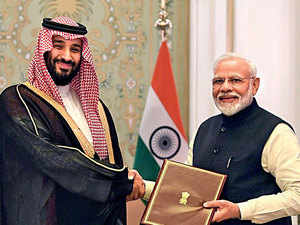
Prime Minister Narendra Modi’s visit to Saudi Arabia last week — his second in three years — was important both symbolically as well as substantively. Ostensibly, this visit was about Modi delivering a keynote at the high-profile Future Investment Initiative Summit, dubbed “Davos in the desert,” an initiative of Saudi Crown Prince Mohammed bin Salman.
But the visit turned out to be about much more. There is a substantive shift happening in India’s approach to the Middle East policy and this visit further reinforced those trends. Since coming to office in 2014, Modi has pushed an aggressive strategy of partnering with key regional powers like Saudi Arabia, the United Arab Emirates and Israel in a bid to attract investments and forge deeper security partnerships. In doing so, he has largely ignored Iran and broken with India’s Cold War-era legacy in the region of merely “balancing” between key actors.
Despite the complexity of governing a country the size of India and navigating its dizzying domestic politics, Modi has managed to visit eight Middle Eastern countries and territories since 2014, more than his four predecessors combined. As so often is the case in the Middle East, the big driver is oil.
India is likely to overtake China as the top driver of growth in oil demand by 2024. During his maiden trip to New Delhi in February, Saudi Crown Prince Mohammed bin Salman said he saw over $100 billion worth of investment opportunities in India over the next two years. India has also shored up its energy investments in the region. India’s ONGC Videsh has acquired a 10% stake in an offshore oil concession in Abu Dhabi, UAE, for $600 million.
The new interest comes against a background of historical indifference. Despite large volumes of trade and a massive presence of Indian expatriates in the Arab monarchies of the Gulf, cross-border investments between the Gulf monarchies and India have remained low for decades. With Modi in office, however, things seem to be changing. Over the past four years, he has built close bonds with young Gulf leaders, including with the crown princes of Abu Dhabi and Saudi Arabia.
India is also showing signs of finally overcoming its reluctance to forge security partnerships with the Gulf states whose security apparatuses had long been closely associated with Pakistan. Such efforts seem to be paying off.
In 2018, the UAE extradited three individuals wanted in India on corruption charges. In 2018, India signed a pact with Oman that allows the Indian Navy to use the strategic port of Duqm, overlooking the Arabian Sea and the Indian Ocean. During Prince Salman’s visit to New Delhi earlier this year, Saudi Arabia promised to share more intelligence to boost counterterrorism cooperation with India, a powerful message considering the then ongoing India-Pakistan confrontation over a militant attack in February that killed 40 paramilitary troopers in Kashmir.
Modi’s visit to Saudi Arabia last week happened against the backdrop of India’s decision to abrogate Article 370 in Jammu and Kashmir and Pakistan’s desperate attempt to internationalise the issue. Unlike Turkey and Malaysia, Saudi Arabia has taken a positive approach vis-a-vis India and has cautioned Pakistan against escalating the crisis.
Despite Pakistan Prime Minister Imran Khan’s visit to Riyadh and the traditionally close Saudi-Pakistan ties, Saudi Arabia has signalled that it understands Indian concerns and sensitivities on the Kashmir issue. Pragmatism is dictating Saudi posture as the very future of the kingdom’s economic model is at stake. It needs new partners like India. It is not without significance that within a week of India’s move in Kashmir in August, one of the biggest foreign investments in the country was announced.
Reliance Industries’ decision to sell a 20% stake in its oil-to-chemicals business to Saudi Aramco at an enterprise value of $75 billion made it one of the biggest foreign direct investment deals in the country. India’s trade ties with Saudi Arabia have been growing and the relationship is no longer merely a buyer-seller one, though energy remains the driver of the engagement.
Saudi Arabia is India’s second biggest supplier of oil after Iraq. It is also now India’s fourth largest trading partner with bilateral trade at $27.48 billion in 2017-18 and Saudi investment of around $100 billion is in the pipeline in areas ranging from energy, refining, petrochemicals and infrastructure to agriculture, minerals and mining. This is a partnership which is becoming truly strategic as Modi himself underscored in his remarks in Riyadh.
During Modi’s visit, two important pacts were signed: while the first was a preliminary agreement between Indian Strategic Petroleum Reserves Ltd and Saudi Aramco that will result in a greater Saudi role in setting up a second fuel reserve facility in Karnataka, the second was between Indian Oil’s West Asia unit and Saudi Arabia’s Al Jeri company for downstream sector cooperation. Modi also announced the formation of the India-Saudi Strategic Partnership Council that will be led by the leaderships of both the countries to “help India address its expectations and aspirations.”
As New Delhi and Riyadh reassess their foreign policy options in a world that is rapidly evolving, Modi’s energetic engagement with Middle Eastern states will enhance India’s footprint in a region critical to the country’s vital interests.
The writer is director-studies at Observer Research Foundation, New Delhi, and professor of international relations at Kings College, London
Download The Economic Times News App to get Daily Market Updates & Live Business News.
Subscribe to The Economic Times Prime and read the ET ePaper online.
Read More News on
Download The Economic Times News App to get Daily Market Updates & Live Business News.
Subscribe to The Economic Times Prime and read the ET ePaper online.









 Get Unlimited Access to The Economic Times
Get Unlimited Access to The Economic Times
